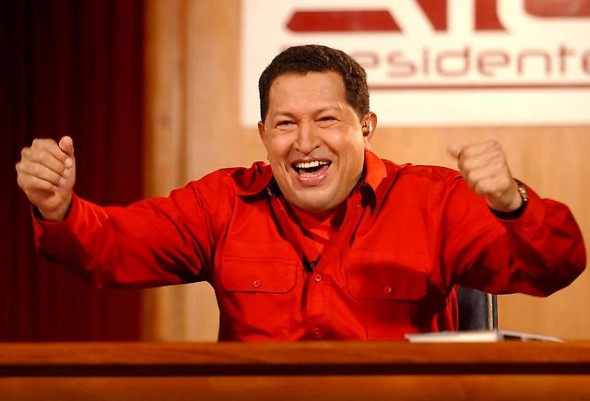|
One Sunday in July 2006, I attended "Alo, Presidente," Hugo Chavez's (very, very) long Sunday television show. Here's what I wrote afterwards.
Jens Erik Gould Daily Journal Staff July 7, 2005 For many, Sunday is a day of rest. But not for President Hugo Chavez and the many supporters who tune into his television program "Hello, President" every seventh day. Last Sunday, crowds of people sat in rows of chairs outside the National Vocational Training Institute (INCI) in the low-income Caracas suburb 23 de enero, the site of the 227th version of the show. Facing the crowd were stacks of speakers channeling the voice of Chavez. Stiff security separated the street crowd from the president. Inside the institute, around two hundred students, military and government officials sat under a canape in the commons. Nearly half the crowd was dressed in red, the color of Chavez's Bolivarian revolution. At the first glimpse of the president, the energy in the crowd changed and everyone was applauding loudly. Chavez emerged from the second floor of the complex and took a seat at his famed his famed "Hello, President" desk in front of the camera. Since the average Sunday program lasts five to seven hours, food and drinks were available for audience members. Communication minister Andres Izarra has said that Chavez spends at least 40 hours a week on the air. Throughout Sunday's six-hour long show, Chavez made an effort to connect with his audience on a personal level. At one point, a young boy yelled "Chavez!" and ran up to the stage. The head of state lifted him and a young girl into his arms and asked them about their families. The president showed his humorous side and knack for impersonation as well. At one point, he swayed back and forth, imitating a drunk man who once told him "Long live Fidel (Castro)." "Drunks say the truth, but when they pass a certain limit, it's just stupidity," said Chavez. The audience responded favorably to his jokes and impersonations. "Yes, that's it, president!" yelled one young man. Chavez spent a large portion of the program speaking with students from Mision Robinson, a government-funded social program that provides elementary school classes for citizens lacking an education. "I didn't know how to read or write," said one student. "I learned it all at Mission Robinson." The president weaved humor into the topic of illiteracy as well. "The guys are lazier," he said, noting that most students present at the show were women. Chavez asked if the students had studied English and jokingly pronounced a couple phrases in broken English. "How are you? What's your name?" he said. The president spent a good twenty minutes with the map of South America. Drawing a line connecting Caracas, Brazilia and Buenos Aires, Chavez the three most populous nations in South America were a new "axis." With the map of South America in his hands, he called the continent "a beautiful woman dancing on only one foot." He said "What do you think," asking the crowd what they thought of the axis. Suddenly, he broke into song, briefly singing a verse containing the same phrase. Sitting in the front row were the Argentine president's sister, Alicia Kirchner, who is also the country's minister of social development, and the newly appointed Argentine ambassador to Venezuela, Hilda Garren. Kirchner gave Chavez several presents. Kircher said that her country and the Chavez government shared "the same philosophy of work" and "collective conscience." "I hope you'll be here with us until 2001," Chavez told the Argentines. Chavez proposed a Latin American social project that would fight poverty and illiteracy in the whole region. "Our people are far from integration," he said about Latin Americans. In many episodes of his program, Chavez maintains harsh dialogue towards the government of the United States. Last Sunday was no exception. He ridiculed recruitment efforts by the United States army. "No one wants to go to war, but they're starting recruitment again," he said. The president mocked Washington's agitation over the Venezuelan purchase of 100,000 AK-103 assault rifles from Russia. "Do they think we're going to take Washington with (100,000 rifles)?" he asked rhetorically. "We're going to take it, but not with 100,000 rifles." He also said precise plans existed to invade Venezuela. Sunday's program is one of several opportunities citizens have to request state aid. Outside the institute, a group of government workers sat around a table processing letters from people around the nation. They highlighted the handwritten requests for pertinent information and marked each one with a label: "Housing," "Health" or "Employment." After the program, a lady approached Energy and Petroleum minister Rafael Ramirez asking for help. Her daughter had been fired from her company because she was a "chavista," she said. Ramirez asked her to give her information to an assistant.
0 Comments
Leave a Reply. |
JENS ERIK GOULDJens Erik Gould is the Founder & CEO of Amalga Group, a pioneering Texas-based nearshore outsourcing firm specializing in IT, software engineering, and contact center staffing. Archives
February 2024
Categories |

 RSS Feed
RSS Feed